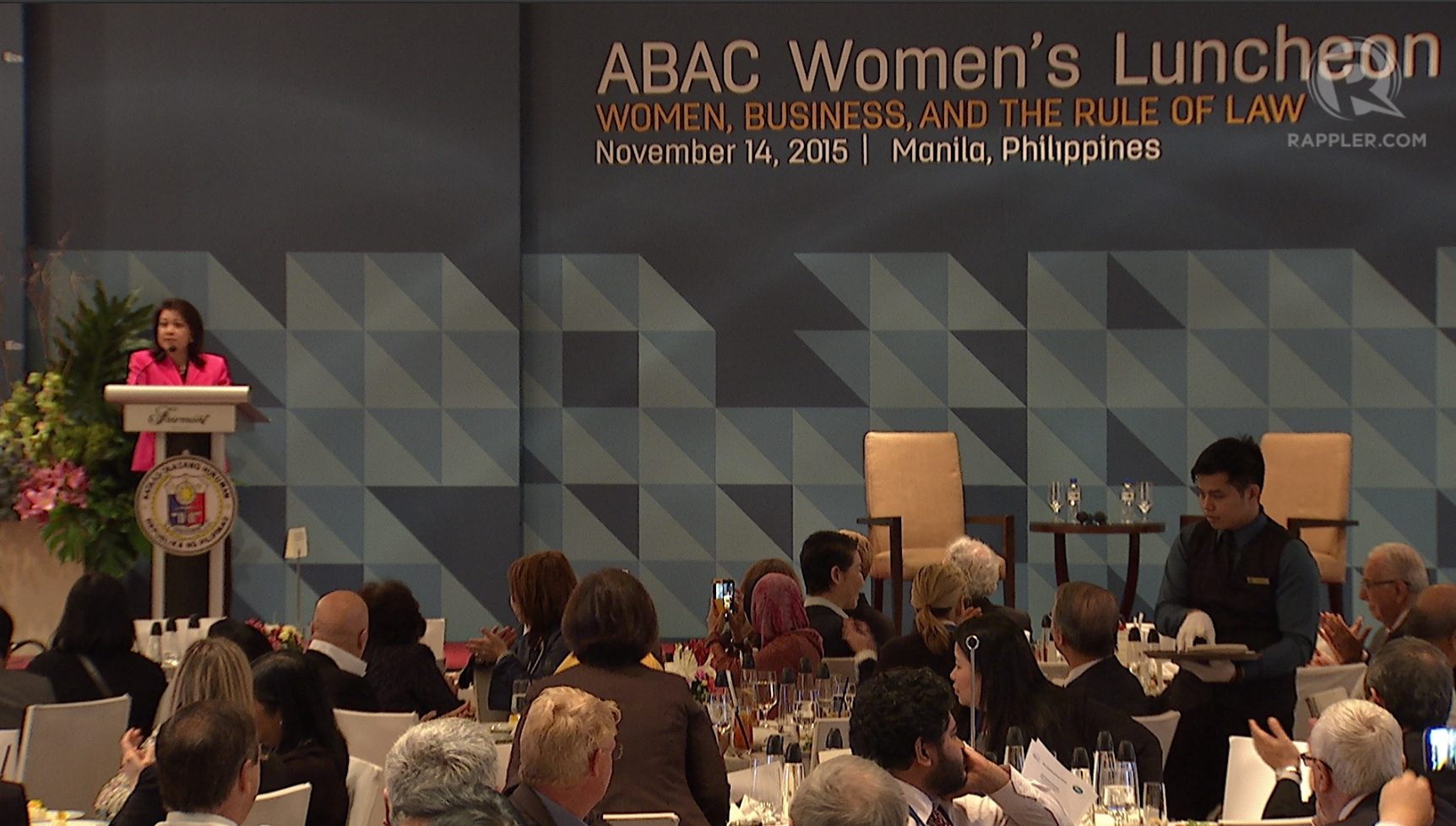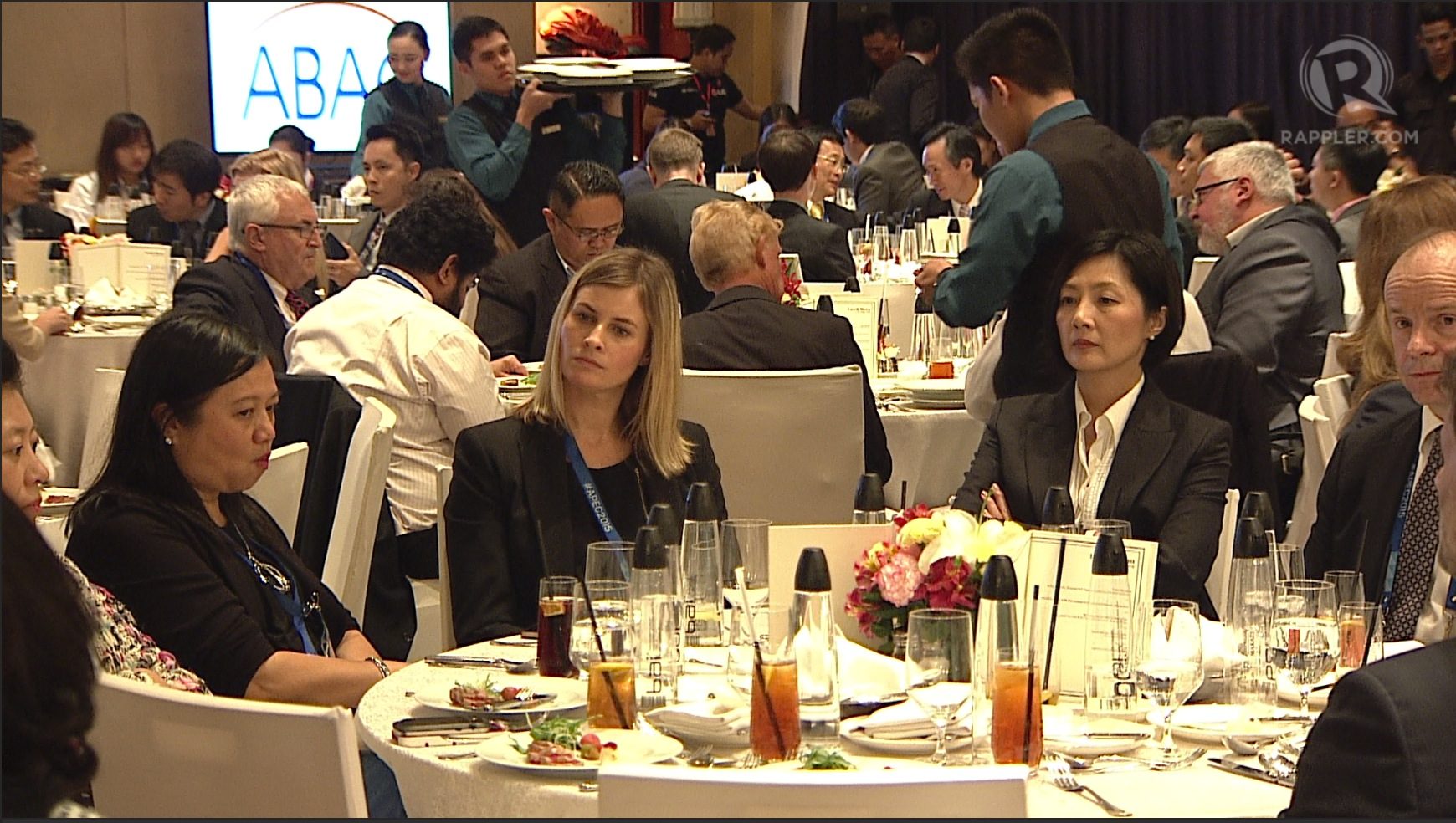SUMMARY
This is AI generated summarization, which may have errors. For context, always refer to the full article.

MANILA, Philippines – Philippine Chief Justice Maria Lourdes Sereno challenged top global business leaders to rethink the way they deal with women, recognizing women’s success in both the workplace and at home.
Proudly wearing a pink suit, Sereno spoke before a gathering of entrepreneurs for the Asia-Pacific Economic Cooperation (APEC) week on Saturday, November 14.
The Philippines’ first female chief justice was the keynote speaker at the Women’s Luncheon of the APEC Business Advisory Council (ABAC), the voice of the business sector in the premier economic forum.
Using her own personal story, Sereno urged the council to “shape traditional thinking,” and to acknowledge what she called women’s unique leadership style, and the need for work-life balance.
Sereno narrated how she gave up a “stellar law firm career” after giving birth to her first child in 1986, and becoming pregnant again in 4 months. She chose to join the academe instead to have a more flexible schedule for her family.
“I was told I will regret my decision to spend time with my children, that I was afraid of success – all these stereotypes. But it was clear to me that if I don’t succeed in my basic, core function to be a mother, to raise my children with values, while my intellectual side developed, I will forever not know myself anymore,” Sereno said in a speech at the Fairmont Hotel in Makati.
Sereno recalled how she even brought her two kids along with her when she received her diploma for her master’s degree in law at the University of Michigan, Ann Arbor.
She quipped: “Those who told me I will regret the decision to spend time with my family can’t say that anymore. Because I’m Chief Justice.”
At 55, Sereno is the Philippines’ youngest chief justice in a century, and one of only 3 female top magistrates in the Asia-Pacific region. President Benigno Aquino III appointed her to lead the Supreme Court in 2012, after the tumultuous impeachment trial of Renato Corona, who was accused of failing to accurately declare his assets and liabilities. (READ: Chief Justice Sereno: Setting limits to power)
Drawing from her own experience, Sereno said working women must not sacrifice their families or “pretend to be masculine” to get ahead in the workplace.
“I don’t enjoy power games or the mind games that men play. It is self-defeating. We should just answer the issue, and solve the problem,” Sereno said.
The Chief Justice said women must not be shamed for “unique abilities” like being consensus builders, crisis solvers, and for helping their loved ones.
“What’s wrong with that? What’s wrong with not being aggressive? What’s wrong with being considerate of other people’s feelings?”
She added: “Families, children used to be taboo in discussions [at work]. Why should they be? They’re part of who we are. I cannot be a good chief justice if I do not acknowledge that part of myself – my family, my children.”
Addressed as “Madame Chief Justice,” Sereno spoke before 300 delegates from APEC’s 21 member economies. The theme of the luncheon was “Women, Business and the Rule of Law.”
Women’s empowerment is one of the pillars of ABAC’s agenda for inclusive growth, the theme of the Philippines’ APEC hosting.

‘Women judges less corrupt’
Sereno said not enough women become business leaders, owners, or entrepreneurs.
To help address the gap, she said the business council must not discriminate against women who take time off from work to attend to ailing relatives.
“When an interviewee is disclosing that she had interruptions in her career to take care of a sick parent or child, that should not be taken against her,” she said.
The Chief Justice also offered what she called “tentative theories” on women’s leadership leadership style and attitude towards work.
“In judiciaries still aiming for a corruption-free regime, the struggle to clean the ranks is more winnable with women leaders, with more women present. That was generally agreed to by a simple theory at the moment by survey perceptions and anecdotal evidence that female judges tend to be less prone to corruption than male judges.”
She explained: “Women judges shun the night life. They attend to families, the church, which makes it hard to strike a deal.”
Sereno said that women decision-makers are “intuitive, consensual and community-based.” She said she, too, has the same characteristics.
“I have a better ability to perceive the unspoken sense of employees. I can detect with my nose, my 6th eye, if something is wrong or something is bothering a person. When I talk to employees, I don’t just talk to deliver units of justice. I say we must let people see the fast dispensation of justice, to feel that justice is served,” she said.
The justice added: “A woman can speak more powerfully about quality on top of quantitative measurements.”
Sereno also spoke about what she called “the glass cliff phenomenon,” which she said showed that women are effective crisis managers.
“There was a survey that showed that when a business is being run well by a male, the preference is for male successor. But if a business being run by a male and it’s in trouble, the preference is for a female to get the situation on hand. It might be an indication that women can solve crises better like in developing countries with corruption.”

Daycare centers, paternity leaves
Sereno said businesses must be more gender-sensitive not just for women but for men as well.
One example is to put up daycare centers In offices where male and female employees alike can leave their children while they work. In the Philippine Supreme Court, Sereno said more male employees leave kids at the daycare.
“We must also expand the meaning of paternity, family leaves. Taking care of one’s family does not just mean taking care of children, but in Asia and the rest of the world, also of parents.”
Delegates applauded Sereno, and added inputs from their own experience.
Microsoft’s Peggy Johnson, a member of ABAC USA, said her company is conducting a program to study “unconscious biases” in the workplace. Johnson said Microsoft wants to ensure that more women graduate as engineering majors, and stay in the workforce.
Beth Smits of the Washington-based Johns Hopkins School of Advanced International Studies was inspired by Sereno’s speech.
“I’ve been a working mother of 3 children for the last 27 years so what she said really resonated with me. I thought that was very refreshing and direct,” Smits told Rappler.
“For women in the workplace, we have to talk very actively about how we are being leaders. I would often have to explain that I will try to find a consensus so that you could bring some of that unconscious bias out into the open, and to help men understand how your own process was working.” – Rappler.com
Add a comment
How does this make you feel?
There are no comments yet. Add your comment to start the conversation.